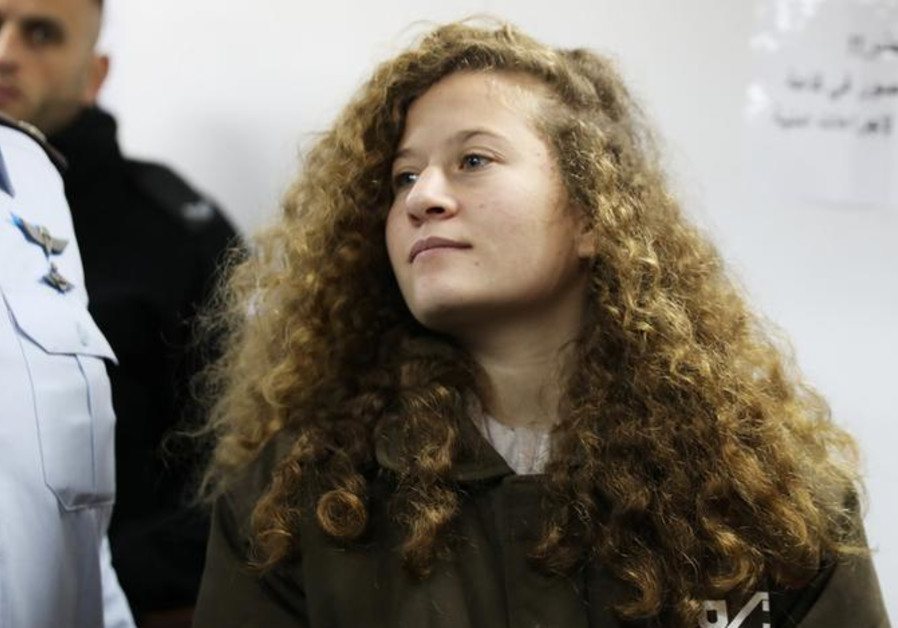The IDF prosecution stated that Tamimi has a “pattern of lawbreaking” which requires her to remain in detention

The Judea Military Court on Wednesday ordered Ahed Tamimi jailed until the end of her trial.
The lawyer for the 16-year-old Palestinian on Monday had delivered a broad indictment of the Israeli “occupation”, of Trump’s Jerusalem declaration and of alleged violations of her rights in demanding her release from detention, but these arguments were ultimately rejected by the court.
On Monday, a major from the IDF Prosecution had countered to the Judea Military Court that Tamimi has “a pattern of lawbreaking” which required that she remain in detention until the end of her trial for shoving soldiers and rock throwing.
In a video of the main incident in dispute, Tamimi can be seen pushing and kicking two IDF soldiers, though there is no sign her small size presented any danger and the soldiers mostly ignored her.
The video brought polarized reactions, with much of the Israeli camp expressing outrage that she and her cousin were not arrested on the spot, and much of the Palestinian camp cheering her aggressive resistance of what they view as Israeli occupation.
She has sparked such attention that dozens of media outlets in Hebrew, Arabic and English as well as diplomats from several European countries attended her hearing, which was standing-room only.
At the heart of Tamimi’s situation are two issues: whether she should be prosecuted at all and, if so, how harshly the IDF should handle her case, including whether to grant her bail pending trial.
Gaby Lasky, a high-profile human rights lawyer and Meretz activist who is defending Tamimi, told the court Monday that the Palestinian teen mostly was protesting US President Donald Trump’s declaration recognizing Jerusalem as Israel’s capital.
She said Tamimi’s message was “Trump needs to take responsibility” for a negative decision which led to an outcry of Palestinian protests.
Lasky slammed Israel and the courts hearing the case as all part of an “occupation” which she said stomps on “international law principles such as those stemming from the Convention on the Rights of the Child…and do not think about ‘what is in the best interests’ of minors” like Tamimi.
She said that IDF laws defining incitement for Palestinians infringe on their free speech and said that settlers who shove or throw rocks at IDF soldiers and police are treated far more leniently.
Further, she said that it was inexplicable that Tamimi was arrested at 4:00 a.m. and was called dangerous when the IDF decided not to arrest her for months after most of the incidents for which she has been indicted.
In addition, she used the night arrest as a defense for explaining Tamimi’s alleged conduct in fighting with IDF soldiers who came to arrest her.
Lasky painted a picture in which the IDF, until the December 15 incident, viewed Tamimi merely as a nuisance, but that after the Israeli public expressed anger at the video of her shoving IDF soldiers, it did a sudden U-turn and made her public enemy number one.
She said that until December 15 there were no witnesses against Tamimi for the several rock throwing incidents she was accused of, but that suddenly after that incident, the IDF rounded up 41 witnesses against her.
The defense lawyer alleged that the system had violated Tamimi’s rights on a variety of levels.
She said that a military intelligence agent joined in on her interrogation and implied that was problematic especially for a minor, whose interrogation is meant to be led by trained police minor-interrogators.
Moreover, she said 30 minutes of the interrogation which one could see on video were left out of the written transcript of the interrogation.
She also slammed the IDF as illegally penetrating data and videos on Tamimi’s telephone to make their case without having gotten a warrant.
Finally, Lasky cited a recent decision by the IDF West Bank Appeals Court to free Tamimi’s cousin, Nur Tamimi, pending her trial, noting that Nur was involved in the same mid-December videotaped incident.
The IDF Prosecution major waived off most of the arguments as not relevant at the pretrial detention hearing stage, saying they would at most be relevant at trial and that the only issue that mattered was whether Tamimi was dangerous.
He presented new evidence of her fighting with soldiers during her arrest as strengthening the argument, along with the videoed incident sand the rock throwing incidents, that she was dangerous.
Further, he said that the IDF does not need a warrant to check a telephone under West Bank laws.
The judge’s decision signaled acceptance of the IDF Prosecution’s arguments.
As reported by The Jerusalem Post
